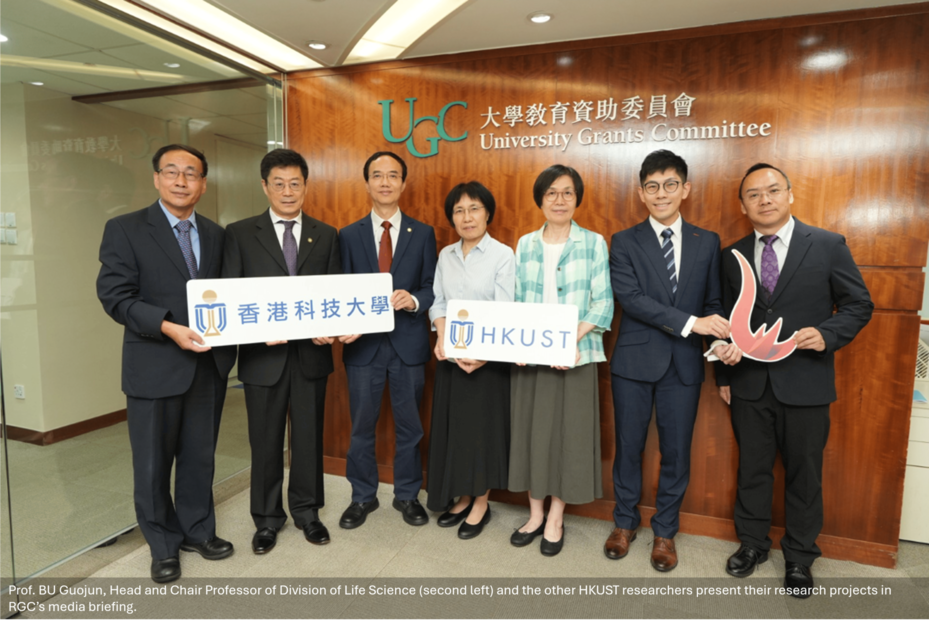
The project titled “Neuroimmune Mechanisms and Modulation in Alzheimer’s Disease led by Professor BU Guojun, Head of the Division of Life Science, has been awarded the Research Grant’s Council Theme-based Research Scheme (TRS) Award (2025/26).
Project Details
This project investigates how our brain and body’s immune systems affect Alzheimer’s disease. Leveraging cutting-edge technologies, researchers aim to differentiate protective and harmful immune responses. This knowledge will guide the development of targeted treatments to benefit patients, families, and society, while supporting Hong Kong’s healthy aging initiatives and economic growth. The project has been granted an approved budget of $76.206 million.
For more details please visit https://hkust.edu.hk/news/hkust-researchers-dominate-rgc-funding-awards-record-breaking-success.
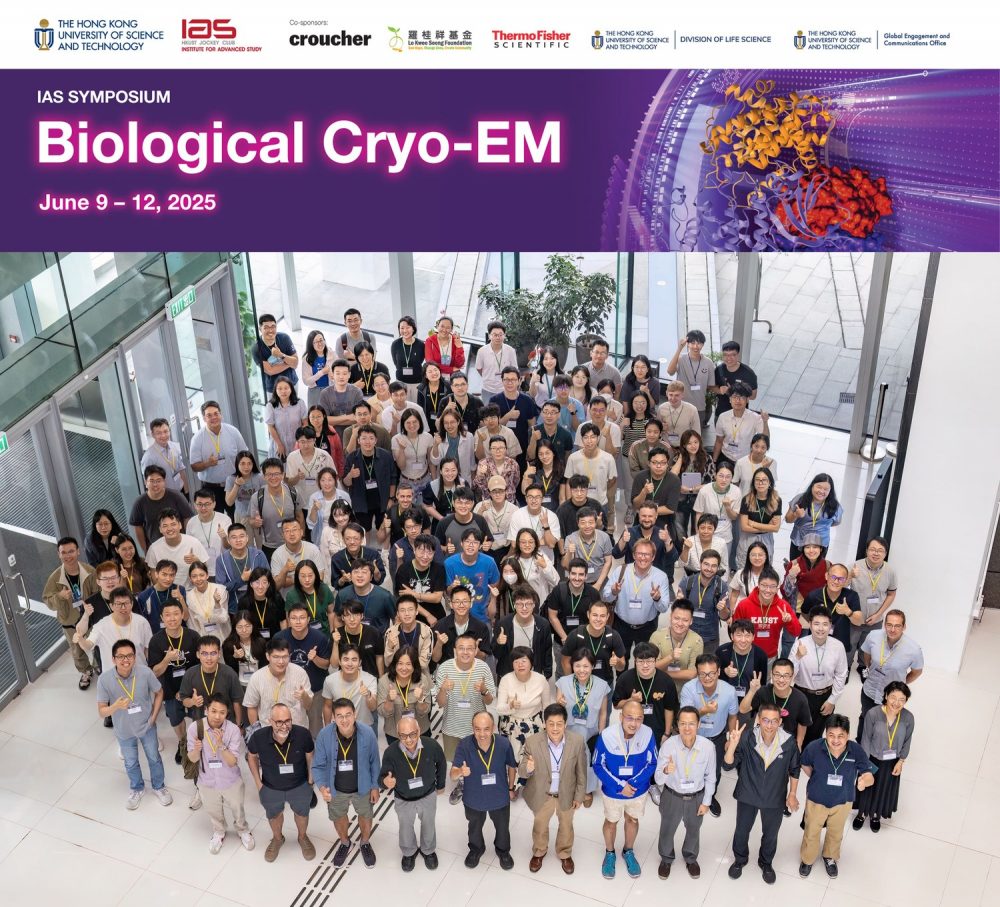
Cryo-electron microscopy (cryo-EM) has revolutionized structural biology by providing high-resolution insights into cellular machinery, enabling researchers to visualize macromolecules in their native states. This transformative technique continues to drive groundbreaking discoveries in the life sciences.
The 2nd IAS Symposium on Biological Cryo-EM at HKUST (June 9-12, 2025) united around 140 experts and attendees worldwide to explore cutting-edge research in single-particle analysis and cryo-ET. Distinguished speakers included Prof. Yifan CHENG (UCSF), Prof. Masahide KIKKAWA (University of Tokyo), Prof. Maofu LIAO (SUSTech), Prof. Yigong SHI (Tsinghua/Westlake University), Prof. Georgios SKINIOTIS (St. Jude Children’s Research Hospital), Prof. Hongwei WANG (Tsinghua University), Prof. Peijun ZHANG (University of Oxford) and Prof. Hong ZHOU (UCLA).
The organisers were Prof. Shanyu DANG (HKUST), Prof. Wilson Chun-yu LAU, (The Hong Kong Polytechnic University) and Prof. Tao NI, (The University of Hong Kong).
Esteemed researchers presented their findings through focused presentations, engaged in substantive discussions, and participated in dedicated networking sessions. The event fostered collaboration and knowledge exchange, aiming to accelerate progress in the scientific community.
The Division of Life Science supported awards for students who shared their research achievement in the symposium. The poster session began with a 2-min oral presentation, and six posters were selected for 15-minute short talks, earning either the Best Poster Award or the Best Short Talk Award.
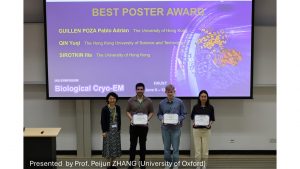
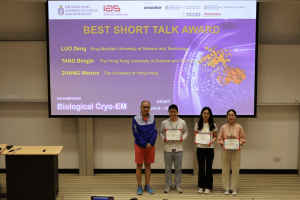
Co-sponsored by the Division of Life Science, HKUST, Croucher, Lo Kwee Seong Foundation, Thermo Fisher Scientific and Global and Communications Office, HKUST.
For more details, visit http://ias.ust.hk/events/202506bcem/home.php.
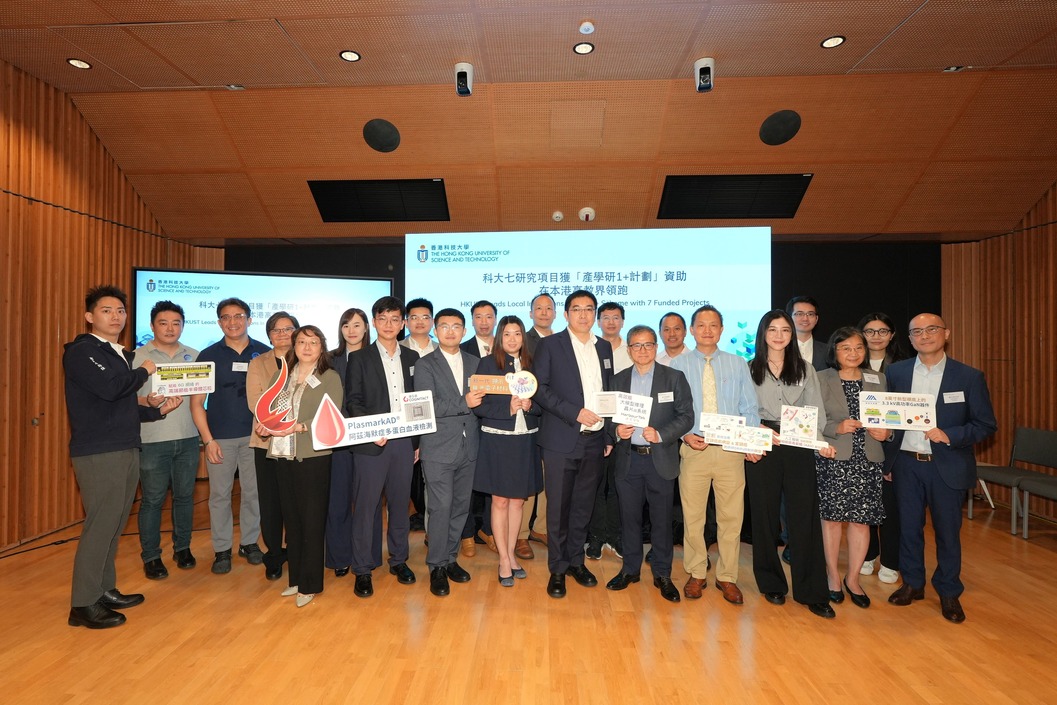
The Hong Kong University of Science and Technology (HKUST) secured grants for seven teams-the highest number among local institutions with two of the projects being awarded from the Division of Life Science.
Prof. LIANG Chun, Associate Professor from the Division of Life Science leads the project titled “Development of a Highly Efficacious First-in-Class Vaginal Gel Targeting DRIPs for Cervical Cancer and Precancerous Lesions”.
Project Details: Current treatments for cervical precancerous lesions rely heavily on invasive surgeries, which pose risks of premature birth, miscarriage, and high recurrence rates, particularly exacerbating healthcare disparities in developing countries. To address this issue, Prof. LIANG Chun and his team have developed a first-in-class vaginal gel that targets DNA replication-initiation proteins (DRIPs). This innovative therapy selectively induces apoptosis in abnormal cells while preserving healthy tissue, providing a safe, effective, and non-invasive alternative to surgery. Preclinical studies show 96% tumor growth inhibition and nearly 100% eradication of cervical cancer and precancerous cells. The team holds 17 patents for this technology and aims for its launch by 2031.
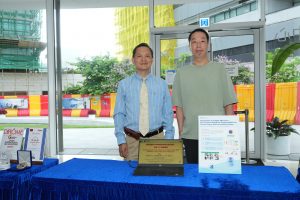
The “Development of a Highly Efficacious First-in-Class Vaginal Gel Targeting DRIPs for Cervical Cancer and Precancerous Lesions”. A group photo of Principal investigator Prof. LIANG Chun, Division of Life Science at HKUST (left) and his Postdoctoral Fellow Marco CHEUNG Man-Hei (right).
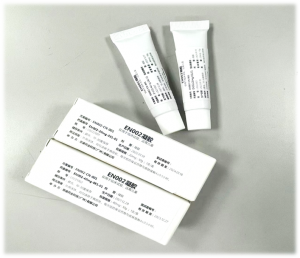
The team has developed a new generation of anticancer drugs that target DNA replication-initiation proteins (DRIPs), including a first-in-class topical gel for skin cancer and precancerous lesions, now in Phase II clinical trial, as shown in the photo. Building on this foundation, the team has developed a vaginal gel which is in preclinical study. This innovative therapy selectively induces apoptosis (programmed cell death) in abnormal cells while preserving healthy tissues, providing a safe, effective, and non-invasive medicine for cervical cancer and precancerous lesions.
Dr. JIANG Yuanbing, a Postdoctoral Fellow working in Prof. Nancy Ip’s lab, in the Division of Life Science, HKUST serves as the Principal Investigator for the Project: “Multi-centers clinical development of blood biomarker panels for detection of prodromal, mild cognitive impairment and early Alzheimer’s disease.” The Project Leader is Dr. OUYANG Li, Managing Director, Cognitact.
Project Details: Amid a global aging crisis, Alzheimer’s disease (AD) affects over 55 million people, with projections of 139 million by 2050. Building on pioneering research by Prof. Nancy Ip at HKUST, Dr. JIANG Yuanbing and the team have developed the world’s first multi-protein blood test for AD. This innovative tool was further developed into two pipelines at Cognitact: PlasmarkAD® Pro Series, offering 96% accuracy in identifying AD-related amyloid pathology and distinct AD-related biological processes; and the cost-effective PlasmarkAD® Lite for timely risk evaluation and screening, particularly in underserved communities. These advancements reduce testing costs by up to 80% compared to traditional PET scans. Supported by the RAISe+ Scheme, Cognitact is launching global trials to validate this transformative diagnostic solutions, and eventually benefit the ageing society at large.
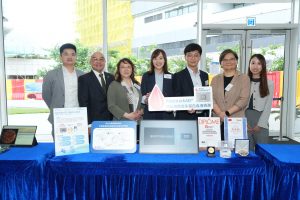
“Multi-centers clinical development of blood biomarker panels for detection of prodromal, mild cognitive impairment and early Alzheimer’s disease”. A group photo of Prof. Amy FU, Research Professor of the Division of Life Science at HKUST (second right); Dr. Fanny IP, Chief Scientific Officer of the Hong Kong Center for Neurodegenerative Diseases (third left); Principal Investigator Dr. JIANG Yuanbing, Postdoctoral Fellow of the Division of Life Science (third right); Project Leader Dr. OUYANG Li, Managing Director of Cognitact (middle); and other team members.
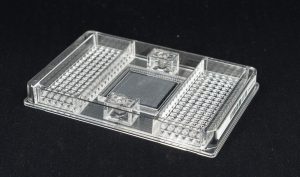
The team has developed world’s first comprehensive multi-protein AD blood test and identified 22 key biomarkers for AD. Combined with proprietary machine learning algorithms, the technology achieves a detection accuracy rate of up to 96%, achieving ultra-sensitive, highly specific and low false positive/negative rate in detecting the disease early. A photo of ultrasensitive blood protein biomarker analysis chip.
Initiated by the government in 2023, the RAISe+ Scheme aims to fund university research teams with strong potential to generate real social impact and market value. To qualify for funding, applicants must demonstrate excellence and distinction in the commercial viability of their project outcomes, as well as their relevance to government policies and community interests, among other areas. Last year, five HKUST teams received RAISe+ awards, and the funding has helped accelerate commercialization of their research discoveries, resulting in a win-win outcome among industry, academia, and research sectors.

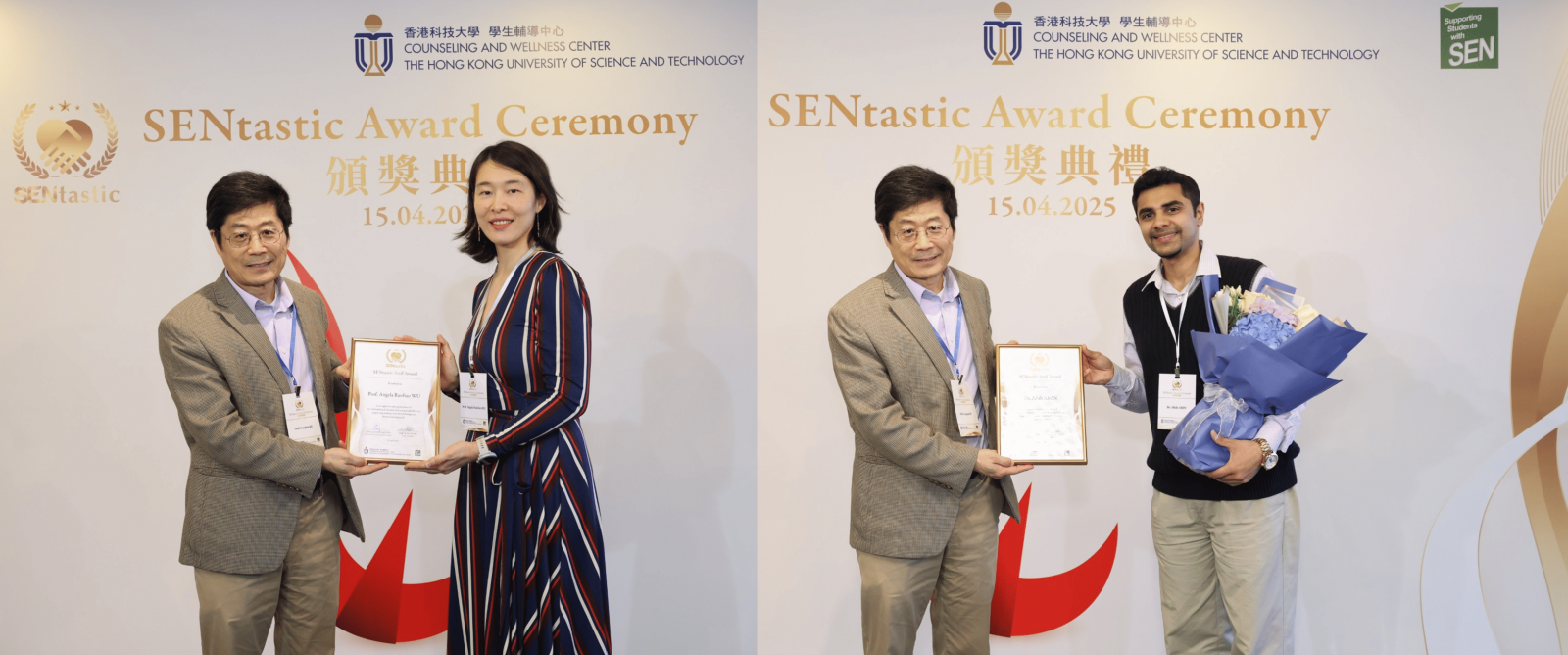
Prof. Angela WU, Associate Professor of Division of Life Science and of the Department of Chemical & Biological Engineering (left picture) and Dr. Aftab AMIN, lecturer of Division of Life Science (right picture) are recipients of the SENtastic Staff Award 2025.
This award honors the dedication of our faculty and staff for their exceptional efforts to enhance the well-being of our students, address diverse learning needs, and support special educational needs. It also serves as a platform for sharing best practices among educators and support staff, inspiring them to maintain their commitment to student care.
Congratulations to Prof. WU and Dr. AMIN and thank you for their contributions to create a more inclusive and supportive learning environment for all students!
For more information, please visit the following link:
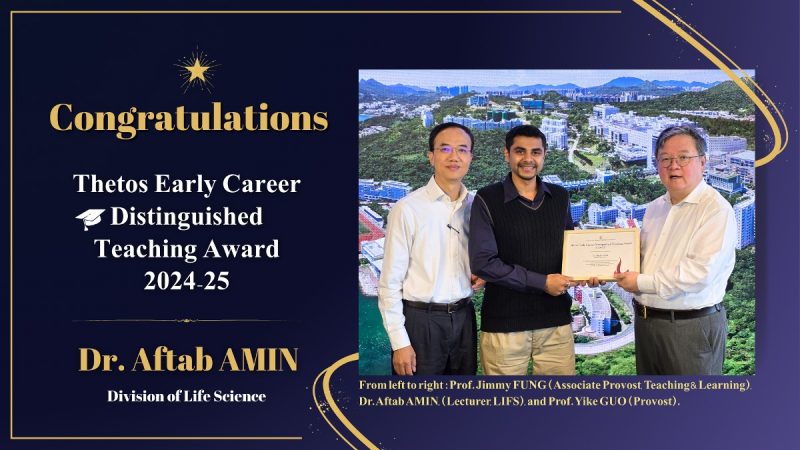
Dr. Aftab AMIN, a lecturer in the Division of Life Science (LIFS), who obtained his PhD in Life Science at HKUST, has been awarded the prestigious Thetos Early Career Distinguished Teaching Award, 2024-25.
The Thetos Distinguished Teaching Award, established by the Thetos Foundation, is the first award at the University dedicated exclusively to recognizing the contributions of teaching-track faculty. It honors their excellence in teaching and supports their initiatives for teaching advancement and personal development.
The Selection Committee, convened by Prof. Jimmy FUNG, the Associate Provost for Teaching & Learning, undertook the challenging task of reviewing the portfolios of a distinguished group of candidates before making final recommendations to Prof. Yike GUO, the Provost.
These awards acknowledge the exceptional dedication, innovative teaching methods, and significant contributions of faculty members to the educational mission of the University.
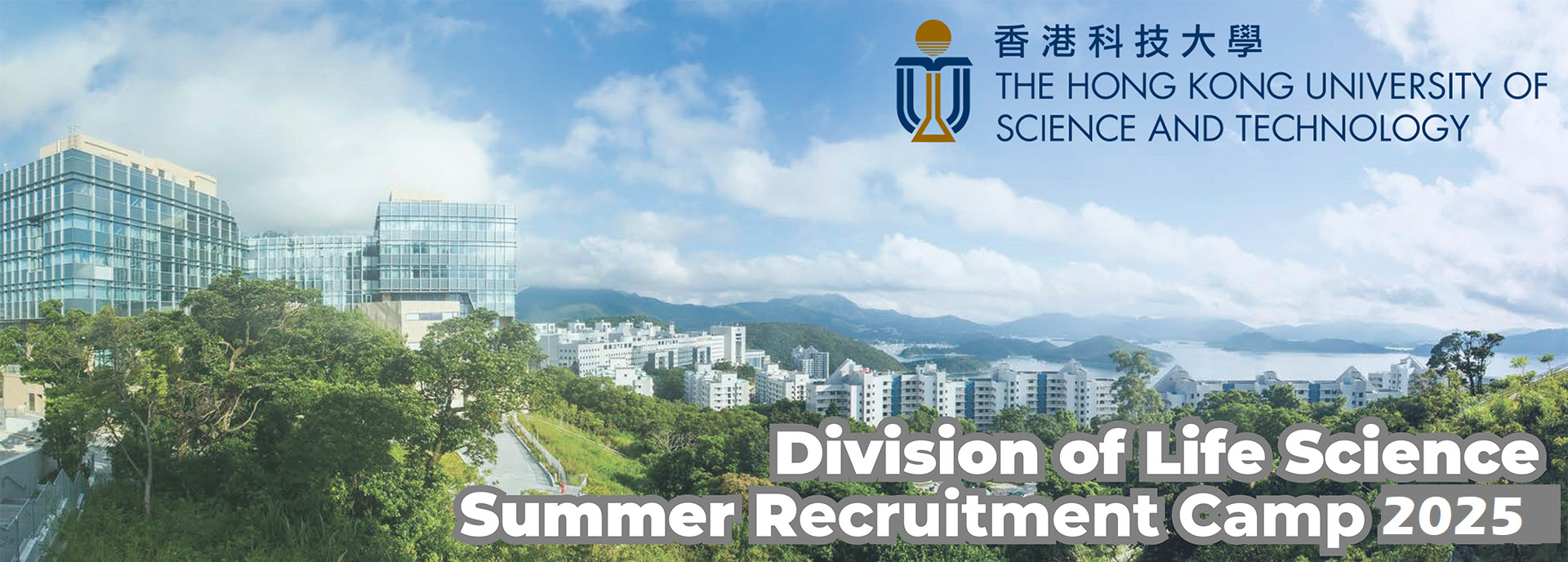
The Hong Kong University of Science and Technology (HKUST) promotes a vibrant and dynamic environment that emphasizes academic excellence, innovation and collaboration. Division of Life Science (LIFS) is host to cutting-edge, international quality research. There are six major areas of research interest including neuroscience, structural biology, cell & developmental biology, biotechnology, genomics and other interdisciplinary research.
This is a 5-day program for those who are interested in pursuing MPhil or PhD programs in Division of Life Science at HKUST in the Fall 2026/27.
Participants will attend a series of informal seminars introducing the current research topics and postgraduate programs offered in the Division of Life Science. These seminars are intended to foster discussion among the participants and faculty members and to serve as a basis for further social and scientific interactions. Participants will also have opportunities to visit the individual research labs and university research facilities, meeting with professors and fellow postgraduate students, and discuss research topics and others, such as preparing for graduate school.
The Program provides opportunity for the participants to learn the individual research groups and let the professors access your ability to conduct research projects in their MPhil or PhD programs.
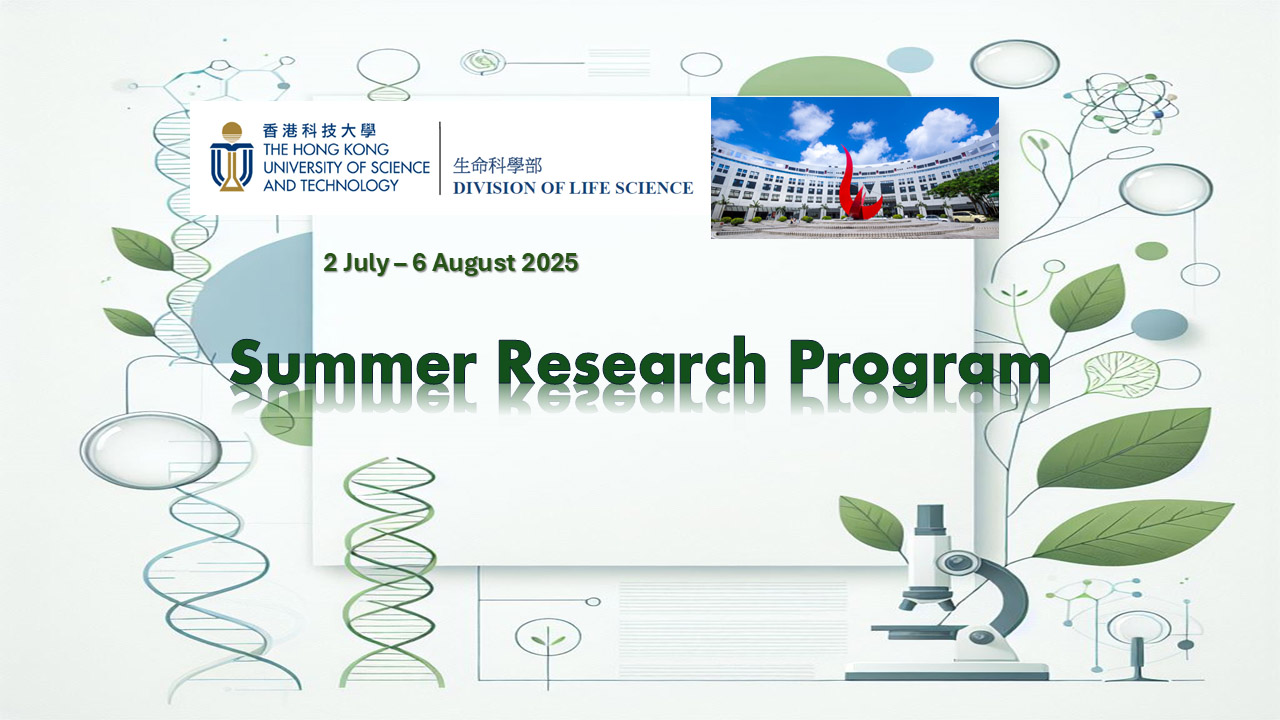
The Summer Research Program is designed for outstanding end-of-year 3 undergraduate students who are interested in pursuing research postgraduate study in the Division of Life Science at the Hong Kong University of Science and Technology (HKUST). This program offers participants the unique opportunity to immerse themselves in the research life at HKUST campus and work with faculty mentors from our Division in conducting research projects in an interactive environment. Participants can also choose to join the interview session of the LIFS Summer Recruitment Camp, which will be held on July 9-10.
2 July – 6 August 2025
Undergraduate students studying in Mainland China and overseas, majoring in Life Science, Chemistry, Biotechnology, Bioengineering, Computational Biology and related programs, who have completed 3 years of study (out of a 4-year bachelor program) and have attained a GPA of 3.2 out of 4.0 (or 80%) or higher.
Non-local students: A subsidy of around HK$10,000 will be provided to cover the on-campus student hostel fee and other local expenses. To enroll in this Summer Research Program, participants are required to pay the summer internship application fee, insurance, visa fee and a 1-credit tuition fee in advance (approximately HK$3,300). Additionally, participants are responsible for applying for a visa (which may take 10-12 weeks) and covering their own transportation costs to and from Hong Kong.
Local students: A subsidy of around HK$10,000 will be provided. To enroll in this Summer Research Program, participants are required to pay the summer internship application fee, insurance and a 1-credit tuition fee in advance (approximately HK$3,300). No housing will be provided. Participants are responsible for their own living expenses and transportation costs to and from Hong Kong, as well as from their living place to HKUST.
Submit online application via the link
Non-LOCAL students: https://ust.az1.qualtrics.com/jfe/form/SV_bCV2XrHe2KriZUi
LOCAL students: https://ust.az1.qualtrics.com/jfe/form/SV_5BHYspGw7pCX2dw
24 March 2025 (Monday)
The review of applications will be conducted by the Division of Life Science. Successful applicants will be notified by the Division as soon as the application is closed. After receiving the Division’s confirmation:
(For successful applicants only) Submit online Visiting Interns application to the Undergraduate Recruitment and Admissions Office (https://join.ust.hk/admissions/visiting/ ).

More than 50 alumni from the Division of Life Science (LIFS) returned to campus on 8 March 2025, to reconnect with fellow alumni and professors at the LIFS Alumni Homecoming 2025.
The event was inaugurated by Prof. Guojun BU, Head of Division, to kick off the lunch reception with a warm welcome and insightful updates on the latest developments within the Division. Representatives from the Life Science Alumni Association (LSAA) seized the opportunity to introduce the LSAA and shared their exciting upcoming agenda, followed by a heartfelt toast from the LIFS faculty members.
The homecoming lunch provided a wonderful opportunity for alumni and faculty to rekindle old friendships and foster new connections. By hosting regular meetups, the Division aims to strengthen the alumni community and cultivate a lasting sense of belonging.
Look forward to more LIFS get-togethers in the future! Stay informed about the Division of Life Science: https://life-sci.hkust.edu.hk/
See more photos of the event here.
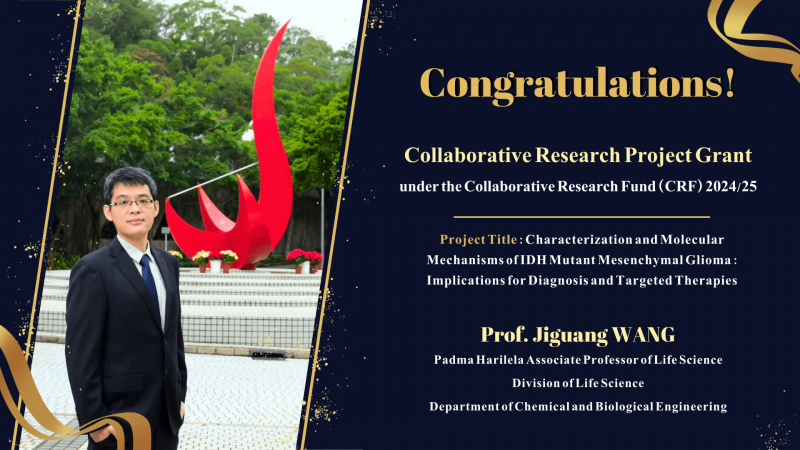
The Research Grants Council (RGC) has announced the results of the Collaborative Research Fund (CRF) 2024/25.
Congratulations to Prof. Jiguang WANG, Padma Harilela Associate Professor of Life Science (Division of Life Science (LIFS) and Department of Chemical and Biomedical Engineering (CBE)) for being a recipient of the Collaborative Research Project Grant (CRPG) under the Collaborative Research Fund (CRF) 2024/25.
Led by Prof. WANG, with HKUST co-investigators Prof. Shuhuai YAO (Mechanical and Aerospace Engineering (MAE) and CBE), Prof. Kai LIU (LIFS and CBE), and Prof. Can YANG (Department of Mathematics (MATH)), their project titled ” Characterization and Molecular Mechanisms of IDH Mutant Mesenchymal Glioma: Implications for Diagnosis and Targeted Therapies”, has received HKD 6 million from RGC. The project will run from 30 June 2025 to 29 June 2028, marking a significant step forward in glioma research.
The CRF supports multi-investigator, multi-disciplinary projects in order to encourage more research groups to engage in innovative and high-quality cross-disciplinary / cross-institutional collaborations.
Read More